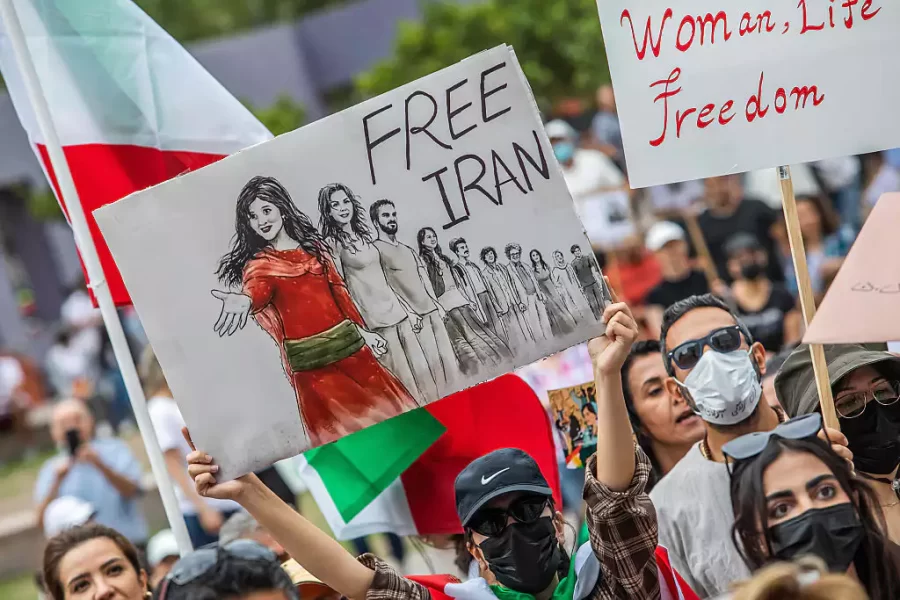Here’s how Biden can Free Iran
In a country that stands for freedom, we need to change our course of action to maintain freedom elsewhere.
February 18, 2023
In response to the massive wave of protests rocking Iran, President Biden expressed his solidarity with the Iranian people by vowing to “free Iran.” However, if President Biden seeks to realize his promises and stand in solidarity with the Iranian people, he must radically shift his policies away from void negotiations and promises of sanction relief towards a “maximum pressure” campaign.
The ideology behind Iran’s foreign and domestic policy is fundamentally incompatible with the rules-based liberal world order. Unlike authoritarian states that seek merely to maintain power domestically, Iran’s guiding principles, policies, and rhetoric center around exporting the Islamic Revolution. Similar to the Soviet Union of old, Iran’s ideology demands a revisionist foreign policy agenda against the liberal world order. In fact, this foreign policy agenda is enshrined within Iran’s post-revolution Constitution and is further revealed in Iran’s funneling of $700 million alone to Hezbollah rather than investing in its dysfunctional economy.
President Biden’s strategy of endless negotiations for a flawed treaty that merely temporarily halts Iran’s nuclear ambitions is futile. The lifting of sanctions for such a goal may increase Iran’s military capabilities and the available resources to finance foreign terrorist organizations such as Hezbollah, the Houthis, and the Badr Organization.
So, how should President Biden respond to this foreign policy conundrum?
The United States must continue with rhetorical support for the Iranian protesters. The United States should also rally a regional and multilateral response with its European and Middle Eastern allies to prepare the infrastructure for weapons deliveries to Iranian protesters if there ever is a major armed uprising or if sectors of the Iranian military defect in favor of the protesters.
There is no good option for any diplomatic negotiation with a revisionist regional power bent on acquiring nuclear weapons. However, the best option would be for the United States to realign its foreign policy goals in solidarity with the Iranian protesters and increase security cooperation with regional allies such as Israel and Iraq.
To curb the influence of Iran’s web of proxies throughout Iraq, Syria, and the Gulf States, the United States must maintain tight sanctions to decrease the availability of Iran’s financial resources for its foreign proxies. This also means increasing an American troop presence in coordination with allies such as Kuwait and Iraq for counterterrorism operations, maintaining its network of military bases in the Middle East, and isolating Iran from the international economy and community.
This can manifest itself in many forms such as increasing security cooperation and military exercises with the Iraqis, Israelis, and other Gulf States. This can also involve increased foreign aid, election assistance, and technical assistance to states that are democratizing or have some democratic frameworks such as Iraq. Military and economic coercion must be a cornerstone of containing Iran and its criminal proxies.
The greatest danger Iran poses to the world is its nuclear program. Nuclear weapons dramatically increase the costs of warfare, decrease the effectiveness of United States deterrence, and spark regional arms races. Accounting for Iran’s refusal to permanently renounce its nuclear program in the now-defunct Joint Comprehensive Plan of Action, there’s little indication that Iran will permanently give up its nuclear ambitions. Therefore, the United States must resort to a containment strategy.
Critics are correct in contending that an aggressive containment strategy with sweeping sanctions and a system of regional deterrence with the Gulf States may legitimize Iran’s narrative of a revolutionary struggle against an aggressive imperialist state seeking to maintain its hegemony. However, attempting to combat this narrative cannot lead to sacrificing the necessary military and economic infrastructure to combat Iranian-backed terror organizations that regularly cause material harm to soldiers and civilians alike.
The costs are too high to justify a war against Iran today, but the United States can rally an international response diplomatically, economically, and militarily to isolate Iran and its allies. Just as the United States adopted a policy of containment towards the Soviet Union, the United States should work towards strengthening Iran’s adversaries, curbing Iranian influence, and promoting democratic governance in regions such as Syria and Iraq when possible.
